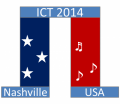Google Search
B2: Module design
A series of reliability tests was carried out to investigate the adhesion properties and thermal stability of CoSb3/Ti/Cu-Mo interfaces. The n-type In0.25Co3.95Ni0.05Sb12 and p-type-In0.25Co3FeSb12 bulks were fabricated for manufacturing thermoelectric modules by an induction melting and a spark plasma sintering process. A Mo-Cu alloy was selected as an electrode for the modules because of its high melting temperature and proper work function value. A series of alloys in the Mo-Cu system was studied and the best composition was selected for matching the thermal expansion coefficient with the CoSb3 thermoelectric materials. The CoSb3/Ti/Cu-Mo interfaces were formed by a spark plasma sintering process. Many thermoelectric modules with the CoSb3/Ti/Cu-Mo interfaces were fabricated with the proper brazing materials by means of repeated firing process. The reliability of the module and interface was evaluated by a tensile strength test, a long term stability test for interfaces, a vibration test, thermal shock test, and a long term stability test for the modules with the interfaces at high temperature. After thermal shock and vibration tests, the tested modules were compared with the original module without damage from reliability tests in terms of the power generation characteristics. It was found that the Ti-interlayer was effective to make the high power generating module with high reliability in the CoSb3 thermoelectric system. Even though the CoSb3/Ti/Cu-Mo interfaces were found to be compositionally stable after a long term reliability test at high temperature in air, the surface of the CoSb3 bulks exposed to air atmosphere at high temperature showed oxidation and Sb evaporation problems.
